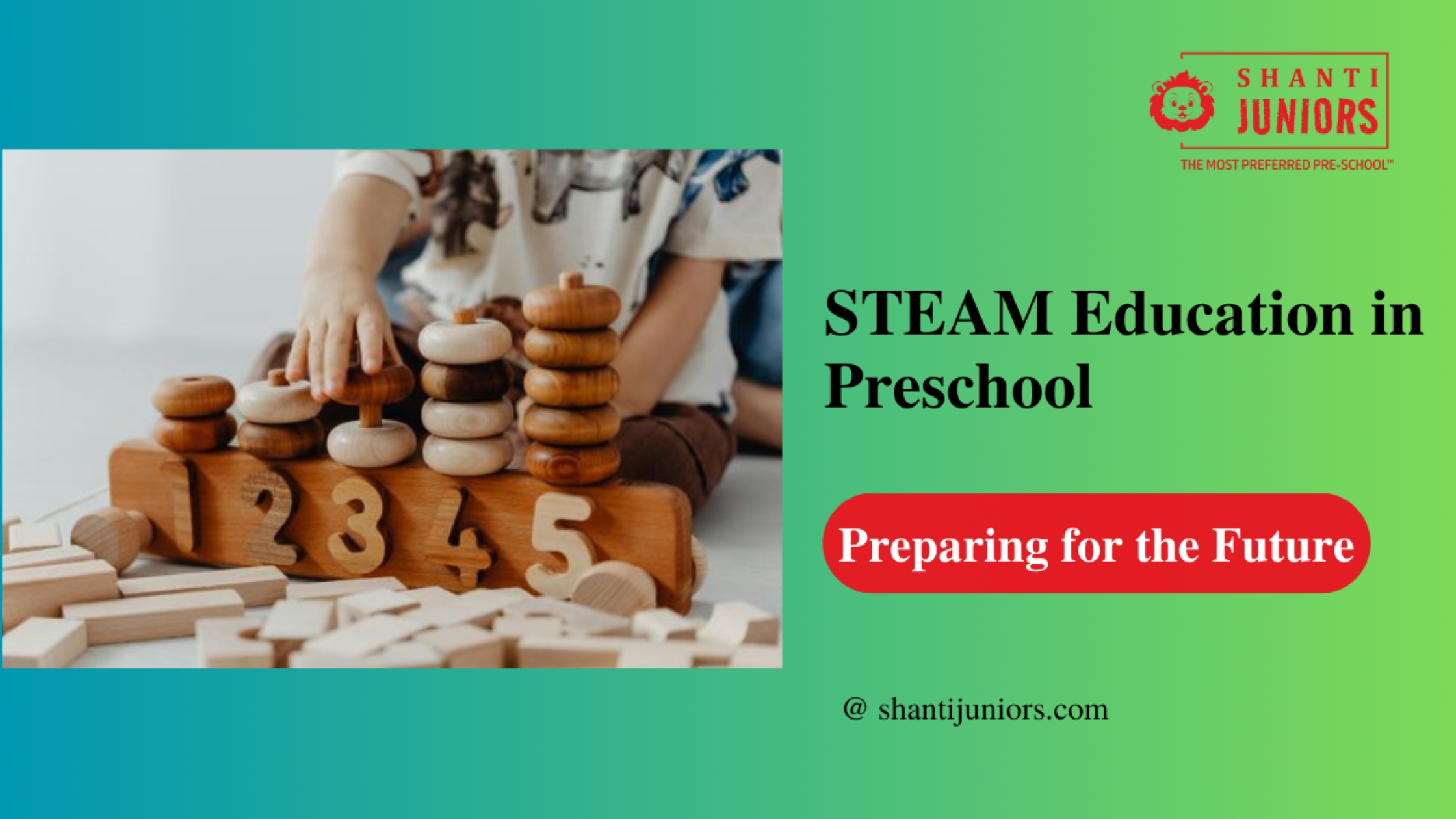

At Shanti Juniors Preschool, we believe that early exposure to STEAM not only prepares children for the future but also nurtures a love for learning, creativity, and problem-solving skills that benefit them throughout their lives.
In recent years, STEAM education, an integrated approach to Science, Technology, Engineering, Arts, and Mathematics, has gained significant attention in educational circles. At Shanti Juniors Preschool, we believe that early exposure to STEAM not only prepares children for the future but also nurtures a love for learning, creativity, and problem-solving skills that benefit them throughout their lives. This article explores how Shanti Juniors integrates STEAM principles into the curriculum, emphasizing the unique ways we prepare preschoolers for an evolving world.
STEAM education is no longer just for older students or specialized fields. By introducing STEAM concepts at the preschool level, we open up pathways to curiosity-driven learning, practical thinking, and real-world problem-solving. In a rapidly advancing digital age, the earlier children are introduced to these skills, the better equipped they’ll be to understand, adapt, and thrive. This early foundation benefits cognitive development, social-emotional growth, and fosters a resilient mindset.
At Shanti Juniors Preschool, we design activities that make STEAM learning accessible, enjoyable, and age-appropriate for preschoolers. Our approach is hands-on and play-based, ensuring that children engage actively in the learning process. Through a combination of guided exploration, thematic activities, and inquiry-based learning, we create a foundation that allows young learners to develop an intuitive understanding of STEAM subjects. Let’s break down our approach to each component of STEAM:
Preschoolers are natural scientists; they are curious and love to explore their surroundings. We harness this curiosity by designing activities that let them observe, experiment, and ask questions. Our science curriculum is centered around sensory experiences, such as water play, sand experiments, and nature walks, where children learn about the properties of materials, weather, plant life, and more. These activities build an understanding of cause and effect, observation skills, and foster a lifelong appreciation for the natural world.
Example Activity: We might have children observe how seeds grow, teaching them about biology in a hands-on way. Children plant their seeds, water them, and watch them grow over days and weeks, understanding basic scientific principles about life cycles and plant needs.
Technology in preschool should be used mindfully, and at Shanti Juniors, we aim to balance screen time with real-world experiences. Our curriculum includes the use of age-appropriate technological tools that teach children about patterns, sequencing, and problem-solving. By incorporating educational apps, digital storytelling, and even basic robotics, we introduce children to the concept of technology as a tool for exploration and creativity.
Example Activity: Children might use tablets with interactive learning games that focus on counting, shapes, or simple coding exercises that build logical thinking skills. These activities teach children to use technology purposefully rather than passively consuming content.
Engineering in preschool may sound complex, but at its core, it’s about building, creating, and experimenting with structures. We encourage children to work with building blocks, construction kits, and even recyclable materials to build bridges, towers, and structures. This fosters spatial awareness, introduces concepts of balance and gravity, and teaches children the value of trial and error.
Example Activity: In a group setting, children might be given building materials like blocks, paper, and glue to construct their own miniature buildings. They discuss and test which structures stand and which fall, learning about stability, balance, and the importance of teamwork.
Incorporating the arts within STEAM is crucial for fostering creativity and self-expression. At Shanti Juniors, we integrate art into all other STEAM elements, encouraging children to use their imaginations, experiment with colors and textures, and express ideas visually. From painting and sculpting to music and dance, the arts are woven into daily activities, enhancing creativity, critical thinking, and emotional expression.
Example Activity: A “painting with magnets” project might combine both art and science, where children move magnetic objects through paint to create unique designs while also learning about magnetism. Such projects make learning fun and engaging, giving children the chance to create and understand scientific principles at the same time.
Our math curriculum emphasizes experiential learning through counting games, pattern recognition, and shapes. Shanti Juniors uses manipulatives like beads, puzzles, and shapes to teach early math skills. By providing these hands-on tools, we help children develop number sense, sorting, classification, and an understanding of basic math concepts. We also integrate math naturally into other subjects, showing children how numbers relate to everyday experiences.
Example Activity: A simple sorting activity with colorful objects allows children to group items by color, shape, or size. This activity strengthens their ability to classify, sequence, and develop a love for math in an intuitive and interactive way.
Through our STEAM-focused approach, Shanti Juniors Preschool aims to prepare children for a future where problem-solving, adaptability, and creativity are key skills. Here’s how our STEAM curriculum sets the foundation for lifelong learning and growth:
At Shanti Juniors, we don’t see STEAM as an isolated component but as an integrated approach that aligns with our core values of nurturing, innovation, and holistic growth. We focus on the "whole child" philosophy, believing that academic skills are as important as emotional, social, and physical development. By embracing STEAM, we provide a balanced, well-rounded educational experience that prepares preschoolers not only academically but also emotionally and socially.
Also Read : How to Prepare Your Child for Preschool
Shanti Juniors commitment to STEAM education equips children with a foundation that goes beyond academics. It’s about nurturing future thinkers, creators, and innovators in a world that increasingly values these skills. By integrating science, technology, engineering, arts, and mathematics into a nurturing, playful, and dynamic curriculum, we prepare children to enter their future schooling with confidence and enthusiasm. In this way, Shanti Juniors is not only preparing children for school readiness but also setting them on a path to thrive in a global society driven by discovery, creativity, and innovation.